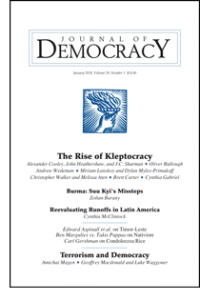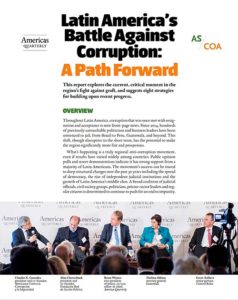 A universal asset in efforts to combat kleptocracy and corruption is the fact that “the anti-corruption ideal is common to all nations, all traditional cultures,” according to Robert I. Rotberg of Harvard’s Kennedy School, writing as guest editor of the Summer 2018 issue of Dædalus: “Anticorruption: How to Beat Back Political & Corporate Graft.”
A universal asset in efforts to combat kleptocracy and corruption is the fact that “the anti-corruption ideal is common to all nations, all traditional cultures,” according to Robert I. Rotberg of Harvard’s Kennedy School, writing as guest editor of the Summer 2018 issue of Dædalus: “Anticorruption: How to Beat Back Political & Corporate Graft.”
Corruption is not new, but its persistence and pervasiveness has made it a pressing social problem, he writes in Accomplishing Anticorruption: Propositions & Methods:
Corruption costs billions in global GDP, erodes quality of governance, and impacts the health and well-being of individuals all over the world. It is also difficult to solve: most countries have failed to move the needle on corruption over the last few decades. But the effort is well-informed, with a great deal of research on how countries have successfully beaten back corruption, including by establishing anticorruption agencies, increasing transparency, and creating merit-based bureaucracies.
Rotberg calls for innovative approaches, such as using automated technology to conduct routine bureaucratic interactions, Dædalus adds. Although corruption is a tenacious problem, there is much reason for optimism as leaders, policy experts, and civil societies continue to refine best practices
 From the perspective of international development agencies, aid conditioned on good governance seemed like a potentially useful component of the anticorruption “toolkit,” says Alina Mungiu-Pippidi of the Berlin-based Hertie School of Governance. However, as recent decades have shown, most of the top recipients of conditional international aid have not shown any progress on indicators of corruption, she contends.
From the perspective of international development agencies, aid conditioned on good governance seemed like a potentially useful component of the anticorruption “toolkit,” says Alina Mungiu-Pippidi of the Berlin-based Hertie School of Governance. However, as recent decades have shown, most of the top recipients of conditional international aid have not shown any progress on indicators of corruption, she contends.
 Given this disappointing fact, she rethinks international development’s standard tools for reducing corruption in Seven Steps to Control of Corruption: The Road Map. A former Reagan-Fascell fellow at the National Endowment for Democracy, Mungiu-Pippidi’s new road map for establishing standards of “ethical universalism” in governance includes diagnosing the norm of resource allocation in a country and accordingly identifying the human agency with the most to gain from spearheading anticorruption efforts, Dædalus adds.
Given this disappointing fact, she rethinks international development’s standard tools for reducing corruption in Seven Steps to Control of Corruption: The Road Map. A former Reagan-Fascell fellow at the National Endowment for Democracy, Mungiu-Pippidi’s new road map for establishing standards of “ethical universalism” in governance includes diagnosing the norm of resource allocation in a country and accordingly identifying the human agency with the most to gain from spearheading anticorruption efforts, Dædalus adds.
Other contributions include:
Fighting Systemic Corruption: The Indirect Strategy by Bo Rothstein (University of Gothenburg, Sweden)
Reforming Reform: Revising the Anticorruption Playbook by Michael Johnston (Colgate University; International Anti-Corruption Academy)
Getting to Accountability: A Framework for Planning & Implementing Anticorruption Strategies by Matthew M. Taylor (American University)
Combating Corruption in the Twenty-First Century: New Approaches by Paul M. Heywood (University of Nottingham, United Kingdom)
Corruption & Purity by Susan Rose-Ackerman (Yale University)
The Problem of Monopolies & Corporate Public Corruption by Zephyr Teachout (Fordham University School of Law)
Corruption & Illicit Trade by Louise I. Shelley (George Mason University)
Preventing Systemic Corruption in Brazil by Sérgio Fernando Moro (Thirteenth Federal Criminal Court of Curitiba, Brazil)
Corruption & State Capture: What Can Citizens Do? by Sarah Bracking (King’s College London)
Strategies for Advancing Anticorruption Reform in Nigeria by Rotimi T. Suberu (Bennington College)
Combating Corruption in Asian Countries: Learning from Success & Failure by Jon S.T. Quah (National University of Singapore)
How Not to Fight Corruption: Lessons from China by Minxin Pei (Claremont McKenna College)







